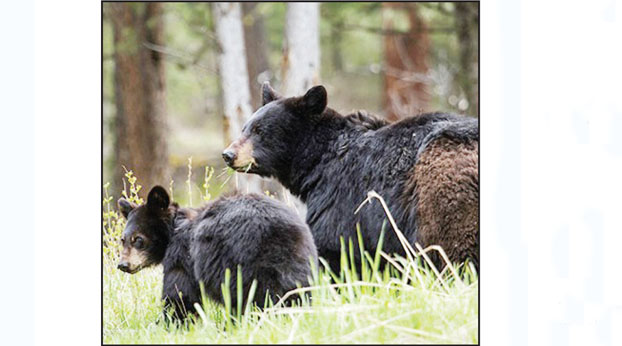Be bear aware this season
Published 9:11 am Wednesday, June 3, 2020

- The arrival of warm weather means that bear activity is on the rise in Kentucky. An increase in their activity can also mean an increase in bear complaints for those living in areas with established populations. (NPS Photo/Neal Herbert)
Bear sightings over the last few weeks have caused many to be cautious of outdoor activities. It is unconfirmed if the bear that has been seen is the same bear or if there are more in the area. While seeing a bear can be a very exciting experience, learning more about bears and their curious nature can better prepare you to make sure that you and your family remain safe and that the sighting remains a positive experience.
Bears are very curious and intelligent animals and they can learn to modify their behaviors from their experiences. They have an excellent sense of smell that can span miles and their eyesight is very similar to that of a human. Black bears are omnivorous and eat a variety of plants and animals. The bears are currently feeding more during this season due to their preparation for the winter hibernation.
Bears can adapt to new foods meaning that they can develop a taste for human and pet foods. They also seek out scents they are attracted to and those scents can include household garbage, cooking utensils and grills, soaps, medications, toothpaste, and even bird seed.
It is very important that you never feed bears because they quickly associate people with food. Bears can become accustomed to being fed by humans and no longer see a boundary where human contact is concerned. Here are a few simple guidelines to keep yourself and your home safe during the bear’s preparation for hibernation season. Be sure to keep the area around your home clean this includes all foods, toothpastes, and sodas and juices. Instead of leaving garbage bags sitting out, use recycling and trash bins outside of your homes.
Other suggestions for making an area less attractive to bears include:
- Only feeding outside pets what they will eat at one sitting, and not leaving pet food out overnight.
- Removing bird feeders in spring and summer. Birds have plenty of natural foods available at this time of year.
- Keeping grills clean and changing drip pans frequently.
- Throwing food scraps in the trash, not a yard or fire pit.
- Surrounding beehives with an electric fence, an effective bear deterrent.
Not only is keeping the area around your home safe important, it is also important to stay safe if you are out and about. This is the perfect time of the year to get the family out and go for a nice hike in the mountains. If you are planning on a hike you will want to check for bears or signs that a bear has been in the area. When a bear is in its natural habitat, they prefer to avoid humans and will react aggressively when they are startled or protecting their cubs. Most human confrontations with bears are usually the result of a sudden encounter and the bear protecting its area, its cubs, or its food storage.
You want to make sure to avoid surprising a bear by making any noise because bears will avoid you if they can hear or smell you. You need to always give a bear its space and never approach, crowd, or even pursue a bear if you see one on a trail. Leave pets at home or make sure to keep them on a leash because a loose dog can startle bears and cause them to chase the dogs back to their owners.
If you do happen to encounter a bear, whether it is on the trail, or in a public area, do not run. Remain calm, make sure to group together, and pick up small children. Stay facing the bear and back away from it slowly. If the bear continues to approach you, try to scare it away by making yourself as large as you can and make loud noises. You need to also carry bear
For more information, you can visit the National Park Service website at www.nps.gov/subjects/bears/safety.htm.






